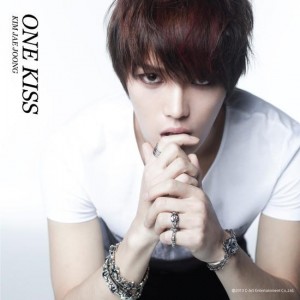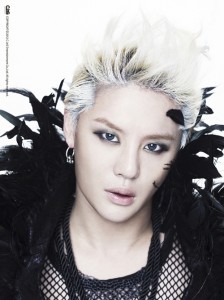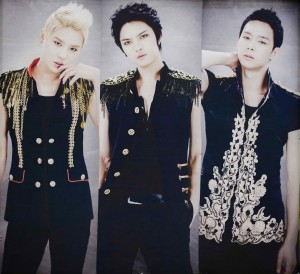 It’s been a while since the JYJ members have embarked on music-related activities, and the countdown to the release of Jaejoong‘s solo album and MV for “Mine” has begun. The album is described to be largely rock-influenced, and the teaser to “Mine” — released January 11th — gave fans a peek at the kind of music and visual concept that Jaejoong will be pursuing for this release.
It’s been a while since the JYJ members have embarked on music-related activities, and the countdown to the release of Jaejoong‘s solo album and MV for “Mine” has begun. The album is described to be largely rock-influenced, and the teaser to “Mine” — released January 11th — gave fans a peek at the kind of music and visual concept that Jaejoong will be pursuing for this release.
Though “Mine” marks Jaejoong’s first formal musical foray into the rock scene, he is certainly no stranger to rock music. Back during his time with DBSK, Jaejoong performed covers of Korean rock classics at every one of DBSK’s solo concerts, which drew interest and attention of rock star notables such as Park Jung-hyun and Kim Bada. While Jaejoong is not the only idol to sing rock music and sing it well, it’s definitely nice to see him focusing his energy on a sound and style that suits him for this album.
Assuming that Jaejoong’s choice to pursue rock music for this album is spurred from his personal affinity for the genre, it’s worth noting that the idea of idols taking charge of the creative design of their own material is still a relatively new and rare phenomenon. JYJ is perhaps the most notable example of this, though it can also be argued that their heavy involvement in the production of their material is more a product of circumstance above all else. However, this does not negate the fact that the JYJ members themselves have played the roles of producer and composer even during their time in the so-called creatively stifling Idol Machine as DBSK.
The current K-pop idol system doesn’t go to great lengths to accomodate idols who wish to have creative input in the production of their own material, which is why idols that are “outside” of the system such as JYJ tend to build a large part of their reputation on the idea that they write and produce their own stuff. On the one hand, JYJ deserves to be praised for taking control, and thus responsibility, for multiple aspects of their material. I mean, let’s face it: almost every K-pop fan has probably blamed “the company” for messing up some part of his/her favorite idol’s comeback, leaving the idol in the position of pity in which s/he’s forced to promote awful music or wear really ugly clothing against his/her own will. In the end, it’s easier to blame the company for bad material than it is to blame the idol because as fans, we are more empathetic towards the idol than we are to the faceless management. And, oftentimes, this allotment of blame to the company is fair. But what happens when the idol is in charge of both producing and promoting the music and the image? And what happens when the music and image is — gulp — bad?
 Before Jaejoong fans start coming after me with pitchforks, I’ll make it clear that I don’t think Jaejoong’s upcoming concept and album will be awful, if only because one song and one 30-second teaser isn’t nearly enough to be making any sound judgments on the overall work. I’ll even admit that I’m a pretty big fan of Jaejoong’s voice and absolutely loved his rock covers during his time in DBSK, so the prospect of Jaejoong doing an entire rock album is really exciting. But at the same time, JYJ has sometimes disappointed me with their self-produced work. I wasn’t a fan of Junsu‘s solo album at all, and though In Heaven boasted a musical style that really gelled with me personally, I had to agree with the critics who lamented the repetitive sound of the album and commented on JYJ’s stylistic limitations as a group of composers and producers.
Before Jaejoong fans start coming after me with pitchforks, I’ll make it clear that I don’t think Jaejoong’s upcoming concept and album will be awful, if only because one song and one 30-second teaser isn’t nearly enough to be making any sound judgments on the overall work. I’ll even admit that I’m a pretty big fan of Jaejoong’s voice and absolutely loved his rock covers during his time in DBSK, so the prospect of Jaejoong doing an entire rock album is really exciting. But at the same time, JYJ has sometimes disappointed me with their self-produced work. I wasn’t a fan of Junsu‘s solo album at all, and though In Heaven boasted a musical style that really gelled with me personally, I had to agree with the critics who lamented the repetitive sound of the album and commented on JYJ’s stylistic limitations as a group of composers and producers.
There’s a lot to criticize about the manufacturedness and unoriginality of idol music, but the one thing that makes the idol system so strong is the fact that everything is a team effort. Though many believe that a singer is only a worthy artist if he/she is capable of writing his/her own material, who’s to say that every good singer needs to be an equally good composer in order to be taken seriously? Conversely, who’s to say that every good composer needs to be an equally good singer? The belief that idol stars are less “worthy” than your average singer/songwriter on the sole merit that idols don’t usually write their own music is somewhat unreasonable.
The reason why K-pop works so well is because producers, composers, concept designers, choreographers and performers work closely together to ensure a quality product, and they do so by allowing each member of the process to play up his/her biggest strengths. While it can be argued that this method of operation is just a good way of covering up the weaknesses of one person with the strengths of another, it’s also an effective business model that is adopted everywhere in the corporate world. No manufacturing company leaves the entire job to one person for the sake of “artistic purity.” K-pop works on this assembly-line style system because it just makes sense.
But even so, the thought that artists who take control over every aspect of their work — whether they’re actually good at it or not — are automatically “better” is one that pervades even amongst pop music audiences. Therefore, whenever an idol begins to produce his/her own material, fans are willing to heap praise onto the idol for being a special snowflake who writes his own music, while critics are willing to give even the most mediocre idol-composed music a pass because, well, at least they’re trying. Thus, idols who compose their own material enjoy an elevated place above their peers, who are seen in comparison as the plastic, manufactured puppets of faceless entertainment companies.
 JYJ is the most prominent example of this, but not necessarily because the quality of their music is undeserving of the praise it’s received. Rather, JYJ’s fandom-delegated status as K-pop’s resident starving artists gives them more “artist points” than any other K-pop idol, to the point where even their worst self-composed music is lauded as being better than any idol pop song, and to the point where JYJ is seen as being better than any other idol simply because “your faves could never.” Never what? Compose their own music? Design their own concepts? Create their own choreography? Maintain a career while being exiled from television broadcasts? Hate to say it, but none of these things make JYJ any better than your typical mainstream K-pop idol.
JYJ is the most prominent example of this, but not necessarily because the quality of their music is undeserving of the praise it’s received. Rather, JYJ’s fandom-delegated status as K-pop’s resident starving artists gives them more “artist points” than any other K-pop idol, to the point where even their worst self-composed music is lauded as being better than any idol pop song, and to the point where JYJ is seen as being better than any other idol simply because “your faves could never.” Never what? Compose their own music? Design their own concepts? Create their own choreography? Maintain a career while being exiled from television broadcasts? Hate to say it, but none of these things make JYJ any better than your typical mainstream K-pop idol.
The core of the issue lies in the fact that, at the end of the day, JYJ are still idols, and idols have the benefit of having an extremely loyal fanbase that is willing to make excuses for them. This isn’t a bad thing; it’s simply a symptom of fans being personally invested in their idols as people rather than artists or even businessmen. Fans are going to be impressed when their idol writes music in the same way a parent is impressed at their three year old’s ability to sing the alphabet song. This is how idol fandom works, and it is beautiful in its own way. But it doesn’t mean that non-fans need to react to idol-produced music in the same way, nor should it mean that idols should be complacent in the mediocrity of their self-composed work knowing that it will be praised unconditionally by fans and non-fans alike. Above all, neither idol nor fan should fall into the belief that idols who compose are automatically better or more “legit” than those who don’t. If anything, idols who do produce their own music get off a lot easier than those who don’t because even their worst music is seen as an example of “artistic expression” simply because it’s produced by the hand of an idol star backed by thousands of fans. (Big Bang, I’m looking at you.)
Thankfully, JYJ hasn’t gotten to a point where they’re taking advantage of the “singer-songwriter superiority complex,” and even though their work isn’t necessarily to everyone’s taste, the amount of calculated effort and detail invested in their work is clear. If anything, it seems as if JYJ creates music on the basis that they don’t really give a damn about what anyone thinks, instead choosing to produce music that aligns with their own tastes as musicians and artists. The teaser for Jaejoong’s upcoming music video is a good example of just that. But at the same time, this doesn’t protect them from criticism by those who happen to dislike their work. Despite their lack of exposure on the mainstream idol scene, JYJ are still idols and have the privilege of being able to sell directly to mainstream audiences. This doesn’t mean that they ought to change their style in order to appeal to the masses, but it does mean that they should be ready and willing to accept criticism from those who will inevitably disagree with their artistic interpretations.
Jaejoong’s music video for “Mine” as well as his solo mini-album of the same name will be released on January 17th. But in the meantime, what say you, readers? Do idol composers deserve all that love just for writing their own material? Or is there more to the story? Leave your thoughts below.
(images via CJeS Entertainment)


